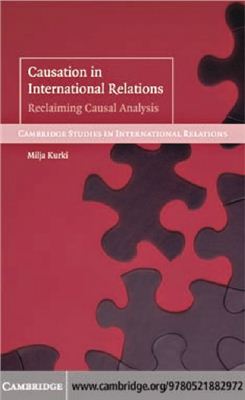Cambridge University Press, 2008. 349 p.
World political processes, such as wars and globalisation, are engendered by complex sets of causes and conditions. Although the idea of causation is fundamental to the field of Inteational Relations, what the concept of cause means or entails has remained an unresolved and contested matter. In
recent decades ferocious debates have surrounded the idea of causal analysis, some scholars even questioning the legitimacy of applying the notion of cause in the study of Inteational Relations. This book suggests that underlying the debates on causation in the field of Inteational Relations is a set of problematic assumptions (deterministic, mechanistic and empiricist) and that we should reclaim causal analysis from the dominant discourse of causation. Milja Kurki argues that reinterpreting the meaning, aims and methods of social scientific causal analysis opens up multi-causal and methodologically pluralist avenues for future Inteational Relations scholarship.
Introduction: the problem of causation and the divided discipline of Inteational Relations.
The Humean philosophy of causation and its legacies.
The Humean philosophy of causation and its legacies in philosophy of science.
Controversy over causes in the social sciences.
Humeanism and rationalist causal analysis in Inteational Relations.
Reflectivist and constructivist approaches in Inteational Relations: more cases of Humeanism.
Rethinking the concept of cause.
Attempts to move beyond Humeanism: strengths and weaknesses.
Rethinking causation: towards a deeper and broader concept of cause.
Reconfiguring causal analysis of world politics.
Expanding horizons in world political causal inquiry.
Reconceptualising causes, reframing the divided discipline.
World political processes, such as wars and globalisation, are engendered by complex sets of causes and conditions. Although the idea of causation is fundamental to the field of Inteational Relations, what the concept of cause means or entails has remained an unresolved and contested matter. In
recent decades ferocious debates have surrounded the idea of causal analysis, some scholars even questioning the legitimacy of applying the notion of cause in the study of Inteational Relations. This book suggests that underlying the debates on causation in the field of Inteational Relations is a set of problematic assumptions (deterministic, mechanistic and empiricist) and that we should reclaim causal analysis from the dominant discourse of causation. Milja Kurki argues that reinterpreting the meaning, aims and methods of social scientific causal analysis opens up multi-causal and methodologically pluralist avenues for future Inteational Relations scholarship.
Introduction: the problem of causation and the divided discipline of Inteational Relations.
The Humean philosophy of causation and its legacies.
The Humean philosophy of causation and its legacies in philosophy of science.
Controversy over causes in the social sciences.
Humeanism and rationalist causal analysis in Inteational Relations.
Reflectivist and constructivist approaches in Inteational Relations: more cases of Humeanism.
Rethinking the concept of cause.
Attempts to move beyond Humeanism: strengths and weaknesses.
Rethinking causation: towards a deeper and broader concept of cause.
Reconfiguring causal analysis of world politics.
Expanding horizons in world political causal inquiry.
Reconceptualising causes, reframing the divided discipline.

